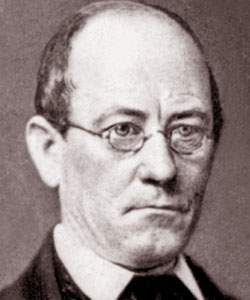John Letcher (Congressional Biographical Directory)
Reference
LETCHER, John, a Representative from Virginia; born in Lexington, Rockbridge County, Va., March 29, 1813; attended private rural schools and Randolph-Macon College; was graduated from Washington Academy (now Washington and Lee University), Lexington, Va., in 1833; studied law; was admitted to the bar and commenced practice in Lexington, Va., in 1839; editor of the Valley Star from 1840 to 1850; delegate to the State constitutional convention in 1850; elected as a Democrat to the Thirty-second and to the three succeeding Congresses (March 4, 1851-March 3, 1859); was not a candidate for renomination in 1858, having become a candidate for Governor; Governor of Virginia 1860-1864; prominent in the organization of the peace convention that met in Washington, D.C., February 8, 1861, in an effort to devise means to prevent the impending war; discouraged secession, but was active in sustaining the ordinance passed by Virginia April 17, 1861; after the war and the expiration of his term as Governor resumed the practice of law in Lexington; member of the State house of delegates 1875-1877; member of the board of visitors of the Virginia Military Institute 1866-1880 and served as president of the board for ten years; again resumed the practice of law in Lexington, Va., where he died on January 26, 1884; interment in the Presbyterian Cemetery.
"Letcher, John," Biographical Directory of the United States Congress, 1774 to Present, http://bioguide.congress.gov/scripts/biodisplay.pl?index=L000256.
John Letcher, Secession (American National Biography)
Scholarship
On 1 January 1860 [John Letcher] became Virginia's leader for four crucial years. Still an optimistic moderate, Governor Letcher championed sectional compromise. In his inaugural address, he fruitlessly urged the legislature to quickly call a convention of all the states. When the legislators finally acted a year later, it was far too late. In the fateful presidential election of November 1860, he supported Stephen A. Douglas, the candidate of the northern Democrats, and after Abraham Lincoln's victory, he resisted pressure to call a state convention that could carry Virginia out of the Union by a simple majority vote. When that pressure grew irresistible, he supported moderate candidates, who gained control of the new convention, which in February 1861 voted against joining the deep South's secession crusade. Even when the war started he held back, waiting five days for the convention's formal vote to secede on 17 April 1861.
Then Governor Letcher acted decisively and led Virginia into the Confederate States of America. Now he was the leader of the most powerful state in the new nation, and he had a new mission, victory in modern war. Practical and pragmatic, he realized that the rebels had to abandon many old states' rights and personal liberties and close ranks to win, so he collaborated with the other southern states and strongly backed President Jefferson Davis and the Confederate government. This acceptance of Confederate supremacy was the main theme of his wartime administration, making him one of the most cooperative and reliable state governors.
Then Governor Letcher acted decisively and led Virginia into the Confederate States of America. Now he was the leader of the most powerful state in the new nation, and he had a new mission, victory in modern war. Practical and pragmatic, he realized that the rebels had to abandon many old states' rights and personal liberties and close ranks to win, so he collaborated with the other southern states and strongly backed President Jefferson Davis and the Confederate government. This acceptance of Confederate supremacy was the main theme of his wartime administration, making him one of the most cooperative and reliable state governors.
F. N. Boney, "Letcher, John," American National Biography Online, February 2000, http://www.anb.org/articles/04/04-00625.html.



